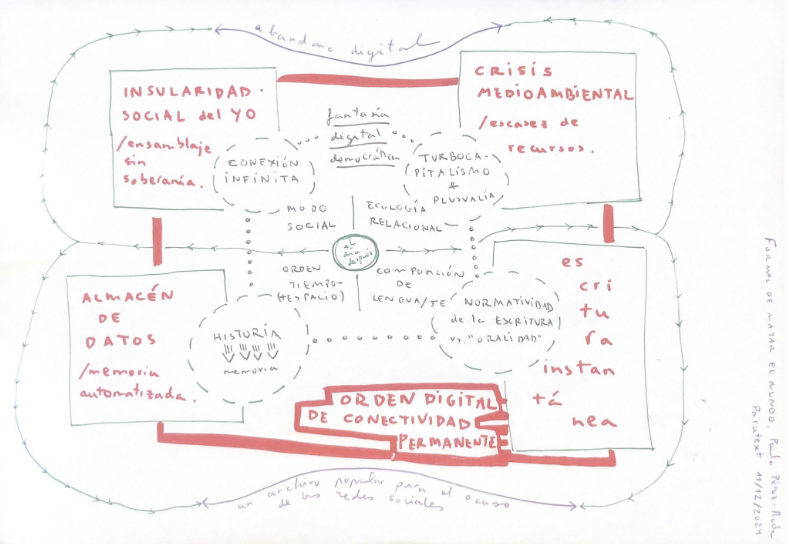Ex-User Experience Research & Public Program, by Paula Pérez-Roda

Formas de matar el mundo / Ex-User Experience is the research and public program by Paula Pérez-Roda, developed within the framework of the IX Artistic Research Grant from Fundación Banco Sabadell – Hangar. Through a methodology consisting of generating and analyzing an archive of digital interactions, practicing digital interactive abstinence, and engaging in material, speculative, and artistic thinking around their intersections, WFormas de matar el mundo addresses the evolution of certain operational technological fictions from the early digital 21st century to the global digital order of permanent connectivity, sustained by distributed, vernacular, and affective dependence on smartphones.
The research in Ways of Formas de matar el mundo activates a combined inquiry into the dominant social mode of portable digitality, the environmental crisis, the vernacular textuality of instant messaging, and the opaque temporality of a present in which the memory-history relationship has turned into storage. At this intersection, it questions the “day after” as a temporal displacement exercise, assuming that it is plausible and necessary to produce, imagine, and speculate on forms of life and relationality beyond data colonialism (Couldry & Mejías). The suspension of the digital order of permanent connectivity toward a future time is guided by central questions: in this “day after,” what would be important to preserve, if possible, from more than 20 years of vernacular textuality and relational forms on social networks? How can these materials be reclaimed from Big Tech, circumventing their terms and conditions to create a minimum cultural heritage of this era? How can this preservation move away from the logic of data and enter the logic of artistic experience, memory, and ecosocial transition? How can we explain what the culture of instant writing was like? Furthermore, what ontological positions can be envisioned from that “day after” that might be transferred to a plausible present of political engagement through life itself? Is it possible to dissent, hack, or desert from the international order of portable digitality beyond the designed insularity of the non-sovereign digital assemblages that are social media profiles?
Ex-User Experience #1. Archivado de RRSS. The archival gesture explores the speculative zone where something alive ceases to be so and examines whether it deploys its effects of truth: whether it truly ceases to be alive. Can we put an end to the usurpation of social, affective, and reader-writer energy by platforms through the archiving of our vital labor freely given to them? In an informational overload context, facing the lack of collective tools to counter the intimate surrender of our time to platforms, EX-USER EXPERIENCE starts from the reader-writer and compositional work with the materials from social media profile “downloads.” It seeks to appropriate the archival gesture as a necessary step within (a) the abandonment of the social subjectivity and text-affective practices of the “user” and (b) an analysis of the necropolitics of social networks that distances itself from the civil and narcissistic principle of the individual profile.
Ex-User Experience #2. Memorandum. Workshop for the Creation of Digital Memories, with Víctor Fancelli Capdevila. The storage and access model for memories and documents managed by the cloud has become popular thanks to the promise of a “digital archive,” a place where documents, information, and materials from our personal or collective projects are stored and readily available without effort or inconvenience. However, platforms appropriate these materials, reserving all rights—especially for exploitation—without assuming any responsibility, and they can delete or modify the data without user consent. What these platforms offer is actually a promotion of so-called “memorable” content that is automated, administered, and very limited to a partial selection of images, videos, or audio files subject to their interests. This laboratory proposes different ecological scenarios and collective guidelines for memory redesign in response to storage overload and the role of memory in communities.
Ex-User Experience #3. Un archivo popular para el ocaso de las redes sociales. A popular archive for the decline of social networks is an experimental archival initiative with the social and artistic mission of making the transition to a scenario of techno-dependency obsolescence in our social interactions, platform capitalism, and its modes of organizing human experience more livable. Leaving the ownership and management of our reader-writer, text-affective energy to corporations condemns us to a life without sovereignty and the loss of heritage. Seeking to generate a brief verbal collection representing part of what life was like between 2012 and 2024, it aligns with the mission of Ways of Killing the World to provide a cultural-textual heritage of the era and understand what the culture of instant writing was.
Ex-User Experience #4. Paratext #80. From the Digital Democratic Fantasy to the Digital Order of Permanent Connectivity: Paula Pérez-Roda’s intervention within the framework of Paratext #80 marked the public opening of the Ways of Killing the World project in the context of Hangar.
Ways of Killing the World is preparing a collaborative publication with Lumbung Press featuring the research results from the Ways of Killing the World process, including essays by Diana Millán Pascual, Pau Olmo, and Víctor Fancelli Capdevila. It has been shared in research and art contexts such as Archiving Care (Toolkit of Care, NeMe/CUT),Otras miradas a la inteligencia artificial: Entre lo imposible y lo indeseable (THECO-UC3M), After Memory (HfG-ZKM), and DigiCAM25: Born-Digital Collections, Archives and Memory (SAS-London), as well as at Hangar Obert alongside Antonio Gagliano.
With the support of:
![]()
Categories: Beques d'investigació | Tags: Beca Fundació Banc Sabadell - Hangar, becabancsabadell
